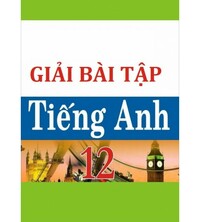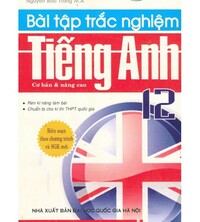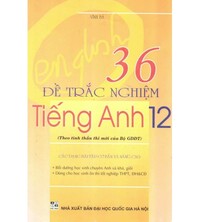6d. Speaking - Unit 6. The Green Environment - SBT Tiếng Anh 12 Bright
1. a) Choose the correct option. b) Fill in each gap with water shortages, overloaded landfills, polluted rivers, energy waste, soil pollution or energy crisis. 2. Complete the dialogue with the phrases/ sentences below.
a
1. a) Choose the correct option. (Chọn đáp án đúng.)
1. Water shortage/Soil pollution could be reduced if we had better water management.
2. Energy waste/Overloaded landfills can be dealt with by conserving electricity.
3. We can improve the state of soil pollution/ overloaded landfills if we replace disposable items with reusable ones.
4 We can deal with energy waste/polluted rivers by improving wastewater treatment.
5. The soil pollution/energy crisis won't be solved unless we maintain and develop renewable energy sources.
6 Overloaded landfills/Soil pollution can be reduced, as long as we avoid using harmful chemicals in farming.
Phương pháp giải:
- soil pollution (n): ô nhiễm đất
- polluted rivers (n): sông bị ô nhiễm
- energy waste (n): lãng phí năng lượng
- energy crisis (n): khủng hoảng năng lượng
- water shortage (n): thiếu nước
- overloaded landfill (n): bãi rác quá sức chứa
Lời giải chi tiết:

1. Water shortage could be reduced if we had better water management.
(Việc thiếu nước có thể được giảm thiểu nếu chúng ta quản lí nguồn nước tốt hơn.)
2. Energy waste can be dealt with by conserving electricity.
(Có thể giải quyết việc lãng phí năng lượng bằng cách tiết kiệm điện.)
3. We can improve the state of overloaded landfills if we replace disposable items with reusable ones.
(Ta có thể cải thiện tình trạng của các bãi rác quá tải nếu ta thay thế đồ vật sử dụng một lần với những đồ vật tái sử dụng.)
4 We can deal with polluted rivers by improving wastewater treatment.
(Ta có thể giải quyết những dòng song bị ô nhiễm bằng cách cải thiện hệ thống xử lý nước thải.)
5. The energy crisis won't be solved unless we maintain and develop renewable energy sources.
(Khủng hoảng năng lượng sẽ không được giải quyết trừ khi chúng ta duy trì và phát triển những nguồn năng lượng có thể tái tạo.)
6. Soil pollution can be reduced, as long as we avoid using harmful chemicals in farming.
(Ô nhiễm đất có thể được giảm thiểu, miễn là chúng ta tránh sử dụng những hóa chất độc hại trong trồng trọt.)
b
b) Fill in each gap with water shortages, overloaded landfills, polluted rivers, energy waste, soil pollution or energy crisis.
(Điền vào chỗ trống với water shortages, overloaded landfills, polluted rivers, energy waste, soil pollution hoặc energy crisis.)
1. Every year, a large number of fish die in _____.
2. The _____cannot be dealt with as long as we use fossil fuels.
3. By reducing the amount of rubbish we throw away, we will reduce the number of _____ in big cities.
4. Saving water during summer can reduce _____.
5. Harmful chemicals and fertilisers used in agriculture can lead to _____.
6. Conserving electricity will significantly reduce _____.
Phương pháp giải:
- soil pollution (n): ô nhiễm đất
- polluted rivers (n): sông bị ô nhiễm
- energy waste (n): lãng phí năng lượng
- energy crisis (n): khủng hoảng năng lượng
- water shortage (n): thiếu nước
- overloaded landfill (n): bãi rác quá sức chứa
Lời giải chi tiết:

1. Every year, a large number of fish die in polluted rivers.
(Hằng năm, một lượng lớn cá chết trong những dòng sông bị ô nhiễm.)
2. The energy crisis cannot be dealt with as long as we use fossil fuels.
(Khủng hoảng năng lượng không thể được giải quyết khi mà chúng ta vẫn còn dùng nhiên liệu hóa thạch.)
3. By reducing the amount of rubbish we throw away, we will reduce the number of overloaded landfills in big cities.
(Bằng cách giảm lượng rác chúng ta vứt đi, chúng ta có thể giảm số bãi rác quá tải trong các thành phố lớn.)
4. Saving water during summer can reduce water shortages.
(Tiết kiệm nước trong mùa hè có thể giảm thiểu việc thiếu nước.)
5. Harmful chemicals and fertilisers used in agriculture can lead to soil pollution.
(Những hóa chất và phân bón độc hại dùng trong nông nghiệp có thể dẫn đến ô nhiễm đất.)
6. Conserving electricity will significantly reduce energy waste.
(Tiết kiệm điện sẽ giảm thiểu đáng kể sự thiếu năng lượng.)
Bài 2
Everyday English (Tiếng Anh thường ngày)
Expressing concerns & Making suggestions (Thể hiện những nỗi lo và đưa ra đề nghị)
2. Complete the dialogue with the phrases/ sentences below.
(Hoàn thành đoạn hội thoại với các cụm từ/ câu bên dưới.)
• What do you mean?
• Something needs to change.
• I have concerns regarding
• It might be a good idea to
• What do you think if
• It's worrying that
Simon: After reading an interesting article on environmental issues, 1) _____ the water shortage that our community has been facing over the past years.
Liz: 2) _____
Simon: 3) _____ so much water is wasted on an everyday bads when we take a shower two or three times a day, wash our cars or clean our gardens. 4) _____
Liz: 5) _____ we write a letter to the city council to draw their attention to this issue?
Simon: That's a start. What else can we do?
Liz: 6) _____ raise awareness of the problem within our community by giving out leaflets.
Simon: Great idea!
Lời giải chi tiết:

Simon: After reading an interesting article on environmental issues, I have concerns regarding the water shortage that our community has been facing over the past years.
Liz: What do you mean?
Simon: It's worrying that so much water is wasted on an everyday basis when we take a shower two or three times a day, wash our cars or clean our gardens. Something needs to change.
Liz: What do you think if we write a letter to the city council to draw their attention to this issue?
Simon: That's a start. What else can we do?
Liz: It might be a good idea to raise awareness of the problem within our community by giving out leaflets.
Simon: Great idea!
(Simon: Sau khi đọc một bài báo thú vị về các vấn đề môi trường, mình bày tỏ sự lo lắng đến việc thiếu nước sạch mà cộng đồng của chúng ta phải đối mặt trong những năm qua.
Liz: Ý cậu là sao?
Simon: Một điều đáng lo là có quá nhiều nước bị lãng phí hằng ngày khi mà chúng ta tắm đến hai ba lần một ngày, rửa xe hoặc dọn vườn. Có điều gì đó cần được thay đổi.
Liz: Cậu nghĩ sau nếu chúng ta viết một lá thư đến hội đồng thành phố để họ chú ý đến vấn đề này.
Simon: Đó là một cách để bắt đầu. Chúng ta có thể làm gì khác không?
Liz: Nâng cao nhận thức về vấn đề này trong cộng đồng của chúng ta có thể là một ý hay.
Simon: Ý hay đó.)
Bài 4
Pronunciation (Phát âm)
Linking wovel to wovel (Nối nguyên âm với nguyên âm)
3. Add the sound in each pair of words in each sentence. Then listen and check.
(Thêm âm vào mỗi cặp từ trong mỗi câu. Sau đó nghe và kiểm tra.)
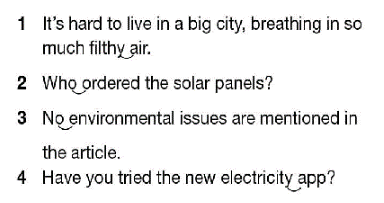
Lời giải chi tiết:
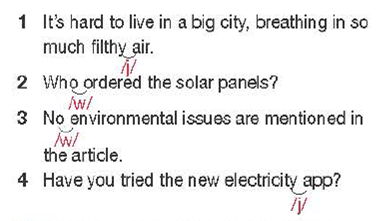
Tạm dịch:
1. Thật khó khăn khi sống ở một thành phố lớn, hít thở quá nhiều không khí bẩn.
2. Ai đã đặt những tấm pin mặt trời thế.
3. Không có vấn đề môi trường nào được nhắc đến trong bài báo.
4. Bạn đã thử ứng dụng điện mới chưa?
Say the sentences, record yourself and check if you pronounce them correctly.
(Tập nói các câu, tự thu âm và kiểm tra xem bạn phát âm chúng có đúng không.)
Search google: "từ khóa + timdapan.com" Ví dụ: "6d. Speaking - Unit 6. The Green Environment - SBT Tiếng Anh 12 Bright timdapan.com"


